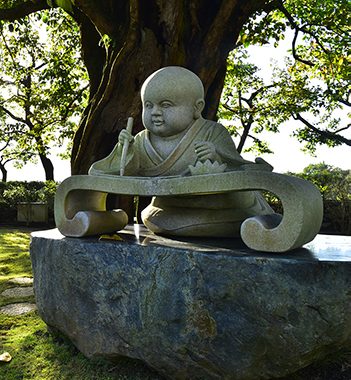The main theme of the Sutra of Profound Gratitude to Parents is the practice of filial piety. Master Cheng Yen feels very strongly about filial piety and emphasizes that “doing good deeds and being filial cannot wait.” This teaching integrates the Buddhist concepts of loving-kindness, compassion, joy, and equanimity with traditional Chinese ethics and morals. Her hope is that this teaching will not only serve as a standard for Tzu Chi volunteers, but that it will also become a principle which people around the world will hold in high esteem. Master Cheng Yen teaches that doing good deeds must begin with filial piety, for this is our duty as human beings. Thus, filial piety is also considered foremost among all good deeds and the key to planting pure causes.
Master first taught the Sutra of Profound Gratitude to Parents in 1989 and 1990. Fearing that family values were weakening throughout the country, she taught this sutra at the monthly Commissioners’ Gathering shortly after the Lunar New Year in 1989. This series of teachings on the sutra yielded a total of sixty-two Dharma talks, which were first published by Tzu Chi Cultural Publishing in 1994. Although these talks were given to differing audiences, and Master explained the meaning of the principles to different depths, she used easy-to-understand examples throughout. In this way, all listeners could benefit from the Dharma, contemplate it, and put it into practice. In 2002, Tzu Chi volunteers adapted this sutra into a musical sign-language performance. This adaptation gained widespread popularity, and eventually went on to be performed at Tzu Chi events throughout Taiwan, the United States, and several other countries around the world.
A translation of Dharma Master Cheng Yen’s teachings on the Sutra of Profound Gratitude to Parents is forthcoming.
Doing Good Deeds and Being Filial Cannot Wait
Master feels very strongly about the practice of filial piety in traditional Chinese culture. Her Jing Si Aphorism, “Doing good deeds and being filial cannot wait,” combines the Buddhist principles of loving-kindness, compassion, joy, and equanimity with a sense of ethics and morality. This is not just a standard for Tzu Chi volunteers, it is a code of conduct that is valued worldwide.
Doing good deeds must begin with filial piety. Being filial to our parents is our duty as human beings. It is foremost of all good deeds, and the key to planting pure causes. The Dirgha Agama Sutra states, “To safeguard the thoughts of the mind, we must put filial piety first.” This means that sincere good deeds begin with filial piety. Only when we constantly bear this in mind can we give rise to the most sincere form of filial piety and great love in our hearts.
The historical value of filial piety is not limited to biological lineage; it is also a key element to the perpetuation of Chinese culture. In the Analects, a disciple of Confucius asked about the meaning of filial piety, to which Confucius replied, “Parents are anxious, lest their children be sick.” The work known as the Classic of Filial Piety says, “Our physical bodies come from our parents; not harming our body is the beginning of filial piety.”
Master often says, “Cherishing our lives is a way to repay our parents. Giving of ourselves is a way to show gratitude.” Our body is given to us by our parents. We only have the privilege to use it, not permanent ownership over it. We must know how to cherish our lives by taking good care of our bodies and minds so that we do not make our parents worry. This is how we can repay them. By using our bodies to help and create blessings for all beings, we show our gratitude for our parents’ grace and the grace of all sentient beings in the world.
The true meaning of filial piety is to exercise the greatest altruistic potential of our lives by making use of our physical strength to benefit others and spreading love to sentient beings. By practicing great filial piety for all and walking the Bodhisattva Path, we give all sentient beings in this world a source of relief, protection, and great support, as well as a safe, stable, and joyful refuge.
Master Teaches the Sutra of Profound Gratitude to Parents
In 1963, Master arrived in Hualien and taught the Earth Treasury Sutra, which is considered the great sutra of filial piety in Buddhism, at Cishan Temple. After the Tzu Chi Merit Association was founded, Master taught it again in 1980. Her strong emphasis on filial piety was evident ever since she began leading her disciples.
Master taught the Sutra of Profound Gratitude Toward Parents from 1989 to 1990.
At that time, Master felt that moral principles of the family were weakening by the day. So, on February 26, 1989, at the monthly gathering of commissioners from across Taiwan following the Lunar New Year, she taught the Sutra of Profound Gratitude to Parents, describing the great grace of our parents. She also extended the spirit of filial piety to the annual Ullambana Festival.
During the Auspicious Seventh Lunar Month, she promoted the idea of not burning joss money and not following superstitions, instead encouraging everyone to be grateful for the grace of our parents. Master ended this round of teaching on June 18th, 1989, after one-third of the sutra was explained. This was because the opening ceremony for the Tzu Chi Junior College of Nursing and the third anniversary of Hualien Tzu Chi Hospital were both held at the same time in September. The advancement of the missions of medicine and education and the unceasing efforts in the charity mission all required more of her time and effort.
From February 16th, 1990, Master used her Wisdom at Dawn Dharma talks to continue her teachings on the Sutra of Profound Gratitude to Parents, and she concluded this teaching in July of the same year. Thus, Master taught it on two different occasions at two different periods in time to different audiences. The first session was during the Tzu Chi Commissioners’ Gathering, where she explained it to commissioners as well as the general audience. The second session was at the morning assemblies at the Jing Si Abode, where she taught it to the Dharma masters, as well as to the staff and volunteers. Due to the differences in these two audiences, Master explained the meaning of the principles to different depths, but she still used easy-to-understand examples. In this way, all who listened could benefit from the Dharma, contemplate it, and put it into practice. Throughout the two sessions, she gave a total of sixty-two talks, which were published by Tzu Chi Cultural Pub. Co. in 1994.
The Sutra of Profound Gratitude to Parents mainly focuses on our parents’ grace and virtues. There are three versions with very different content. An Shigao’s translation, “The Sutra of Profound Gratitude toward Parents as Taught by the Buddha,” is viewed as the authentic sutra, and its content is quite short. The British Museum’s collection of the Sutra of Profound Gratitude to Parents from Dunhuang is thought to be a fabricated sutra. Dharma Master Kumarajiva’s translation of the Sutra of Profound Gratitude to Parents was allegedly written by people in later times and is not considered to be original either. However, because Master Kumarajiva’s translation is the one most widely circulated, this compilation is based on these sutra passages, which Master Cheng Yen used in her explanations.
The Sign Language Performance of “The Sutra of Profound Gratitude to Parents”
In 2001, Wang Tuan-cheng compiled the essence of this sutra into lyrics, which were set to music composed by Kuo Meng-yung. Wang divided “The Sutra of Profound Gratitude to Parents” into eight sections: Prelude, The Beginning, Pregnancy, Ten Graces, Parental Love, Children’s Wrongdoings, Repaying Grace, and Finale. On May 6th, 2002, at Tzu Chi’s 36th Anniversary, 176 volunteers performed this musical adaptation of the sutra.
This musical sutra adaptation deeply resonated with people’s hearts, awakening repentant thoughts of filial piety. Master remarked, “The sutras are not just to be chanted; we can also sing them. Culture is not just something we see; it is also something that we can listen to.” The musical adaptation of the Sutra of Profound Gratitude to Parents quickly started a wave of excitement outside Taiwan, with its first international performance at the Tzu Chi USA Southern Region Office in Houston, Texas, then in many other states in the USA, as well as Australia, the Philippines, Malaysia, Singapore, China, and other places. Volunteers actively promoted this musical sutra adaptation to inspire a sense of filial piety in the hearts of all.
The performers were of different ethnicities, religions, ages, socio-economic backgrounds, and nationalities. Religious leaders, entrepreneurs, collegiate volunteers, staff from the Four Missions, and others all participated. This truly brought everyone into the sutra treasury as they performed and passed it on. Between July 2002 and 2016, there were over fifty-five performances across Taiwan, while internationally, there were over seventy-five large-scale performances in total.
Since 2005, at the graduation ceremonies of all Tzu Chi schools, teachers and graduates have performed this musical sutra adaptation. Apart from expressing gratitude for parents’ grace in raising them, it also reminds every student who is about to graduate and enter society to remember to cultivate thoughts of goodness and employ their altruistic potential.
Principles of this Compilation – Faithfulness, Comprehensibility, and Elegance
The editorial team abides by the principles of faithfulness, comprehension, and elegance. We follow Master Cheng Yen’s sequence of ideas and her tone of teaching so as to be faithful to her teachings and to the context. We have preserved the meanings, principles, and the flow of the words so that they are clear and easy to understand, and we have focused on the elegance of the writing so that the reader may find the teachings readable and enjoyable.
The writing on the cover is based on Master Cheng Yen’s calligraphy when she first transcribed the Sutra of Infinite Meanings and the Wondrous Lotus Sutra by hand. The inclusion of the words “teachings and commentary” in the book title represents how, while Master expounds the sutra, she makes use of events from the past to the present, across the long river of time. This affirms that “all buddhas share the same path”; the teachings are just as relevant to modern living as they were when Sakyamuni Buddha originally taught them. The word choice is modern, while also retaining the usages of many ancient words. Parts of the teachings also contain original terms created by Master Cheng Yen, which differ from more common expressions, yet can explain the sutra’s key meanings even more thoroughly.
The original Chinese publication of this book was made possible by the Jing Si Abode’s monastic practitioners, Pure Practitioners, Tzu Chi volunteers, and others. A total of more than 250 participants helped to transcribe, proofread, and compile the content from the original audio recordings.
After editing, in pursuit of the utmost circumspection and reverence for the teachings, we requested volunteers and masters at the Jing Si Abode to read the transcription, and to give feedback on the matters and principles contained within, as well as any doubts they may have had as they read it. We finalized the draft only after repeated discussions and amendments.
For the Chinese version, designer Chen Jun-Liang’s team from Freeimage Design helped with the cover and proposed a text layout where each verse can inspire silent contemplation and each paragraph can stand on its own, while together they form an entire chapter. This design allows the Buddhist sutra to suit modern Chinese reading habits and to be more deeply integrated into our contemplation of daily living[1]
Department of Dharma and History Compilation
Jing Si Abode, January 2016




